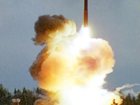U.S. scientists are to investigate what led 22 whales to beach themselves in Florida -- killing 17 of them -- one of three such incidents in North America over the weekend.
The dead whales will be "dispersed at different labs across Florida for necropsy," or animal autopsies, Blair Mase, regional stranding coordinator for the National Oceanic and Atmospheric Administration, told Agence France Presse on Sunday.
 Full Story
Full Story
A new underwater explorer hit the seas this summer, armed with cameras, strobes and sonar and charged with being a protector of sorts to a half-billion dollar resource — the Atlantic scallop catch.
The stainless steel Seahorse, which gets its nickname from its s-shaped silhouette, traces its roots to a conversation a decade ago between a biologist and a fisherman who was seeking a better way to track the scallop population.
 Full Story
Full Story
Russian President Vladimir Putin has fired the chief of a key state-run aerospace bureau following several launch failures, the Kremlin said Monday.
The head of the Khrunichev space center, Vladimir Nesterov, has been relieved of his duties, said a decree dated August 31 and published on the Kremlin website Monday.
 Full Story
Full Story
U.S. Secretary of State Hillary Clinton voiced hope Friday the United States would act beyond its pledges on curbing emissions as she visited Pacific islands threatened by climate change.
Clinton, the first U.S. secretary of state to take part in the annual Pacific Islands Forum, pledged $25 million in new assistance to help the low-lying nations of the region plan and adapt to expected rising water levels.
 Full Story
Full Story
Neil Armstrong was a humble hero who saw himself as a team player and never capitalized on his celebrity as the first man to walk on the moon, mourners said Friday outside a private service attended by fellow space pioneers, including his two crewmates on the historic Apollo 11 mission.
Hundreds of people attended a closed service for Armstrong Friday at a private club in suburban Cincinnati. A national memorial service has been scheduled for Sept. 12 in Washington, although no other details have been released on the service or burial plans for Armstrong. He died Saturday at age 82.
 Full Story
Full Story
Workers have discovered hundreds of bones belonging to Ice Age animals, including mammoths, mastodons and glyptodonts, while digging to build a wastewater treatment plant north of Mexico City.
The bones could be between 10,000 and 12,000 years old and may include a human tooth from the late Pleistocene period, Mexico's National Institute of Anthropology and History said Thursday.
 Full Story
Full Story
A controversial idea to brake global warming, first floated by the father of the hydrogen bomb, is affordable and technically feasible, but its environmental impact remains unknown, a trio of U.S. scientists say.
Sowing the stratosphere with particles to reflect the Sun and cool the planet is possible with current technology and would cost a fraction of the bill from climate change or reducing emissions by fossil fuels, they argue.
 Full Story
Full Story
A scrap of bone found in a cave in Siberia has shed light on the genetic odyssey of an enigmatic group of humans called the Denisovans, scientists reported on Thursday.
The existence of the Denisovans only emerged in 2010, through a piece of finger bone and two molars unearthed at the Denisova Cave in southern Siberia's Altai Mountains and dated to around 80,000 years ago.
 Full Story
Full Story
Twin satellites rocketed into orbit Thursday on a quest to explore Earth's treacherous radiation belts and protect the planet from solar outbursts.
NASA launched the science probes before dawn, sending them skyward aboard an unmanned rocket. Within 1½ hours, the two satellites were flying free. "We're all thrilled, just as excited as can be," said launch director Tim Dunn.
 Full Story
Full Story
Australian scientists said Thursday they had successfully implanted a "world first" bionic eye prototype, describing it as a major breakthrough for the visually impaired.
Bionic Vision Australia (BVA), a government-funded science consortium, said it had surgically installed an "early prototype" robotic eye in a woman with hereditary sight loss caused by degenerative retinitis pigmentosa.
 Full Story
Full Story



